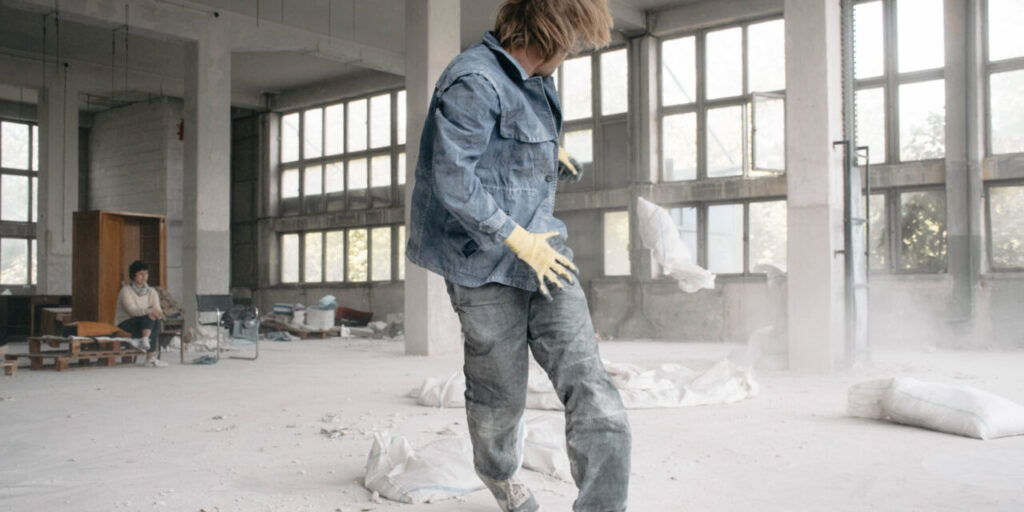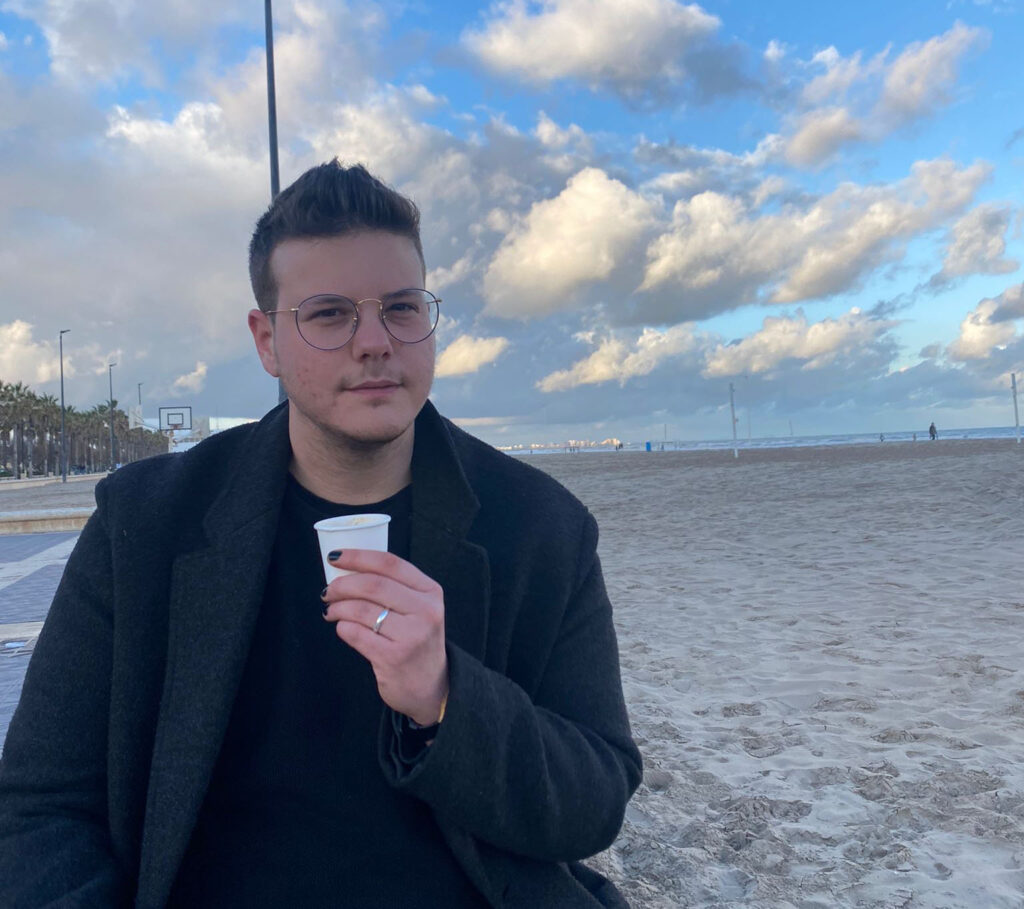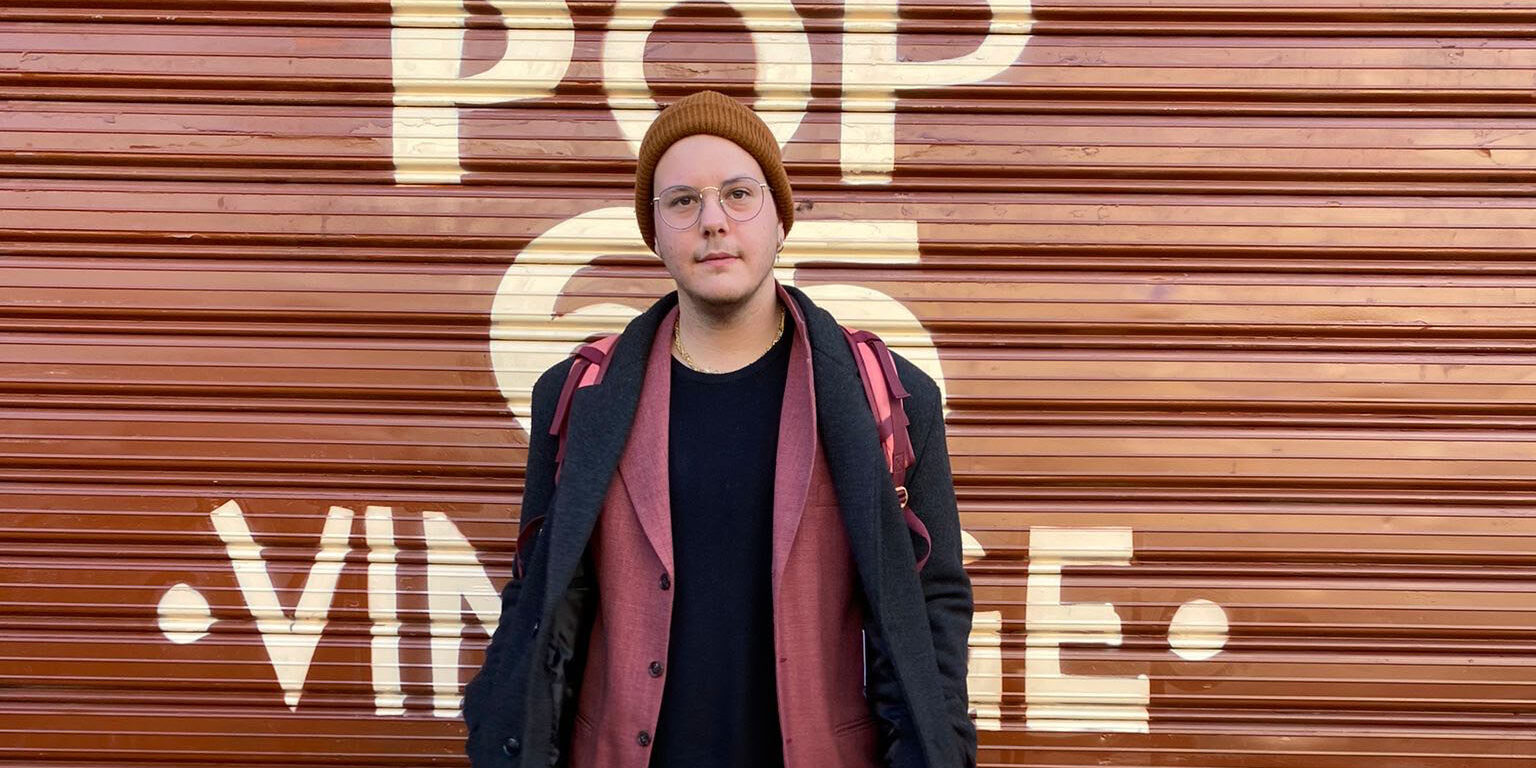Dramaturg, activist, writer, and columnist Espi Tomičić talks to Ana Fazekaš about class, dance and gender, how his new work explores the performance of masculinity and combining art with activism.
Espi Tomičić is one of the most prominent young voices in Croatian performing arts and literature. Known primarily for his monodramas Ne zaboravi pokriti stopala (Don’t forget to cover your feet) and Your Love is King, Tomičić’s work has recently shifted towards contemporary dance and performance art.
Ana Fazekaš: Most recently you’ve worked as dramaturg on the dance piece Boys, Boys, Boys that premiered in Zagreb Dance Centre and focused on topics of performing masculinity and the male dancing body on stage; what were your main interests while working on this piece?
Espi Tomičić: I started being interested in gender studies and performativity of gender while studying at the Academy, and I was excited to work with cis male dancers, exploring how they thought about their masculinity, how they approached gender/ed performances. As a trans guy, I think about my masculinity and its performances on a daily basis, and I wanted to reach out to guys who don’t necessarily need to think about their presentation in ways that I do, but at the same time, as dancers, maybe are aware of how their bodies are present, especially in a world that still perceives dance as a feminine field. We started the process on a residency in Svetvinčenat Mediterranean Dance Centre, discussing the dancers’ personal experiences, what they recognize as masculine and feminine on the level of body and movement.
It was interesting to see how their perspectives diverged, especially given that they came from different fields – street dance, hip-hop, and contemporary dance – there was no universal consensus on what masculinity or femininity looked like. We developed choreographic material from that research, trying to make the movements less illustrative and obvious.
The production team wanted to target a broader young audience so a lot of the PR was done through Tinder and Grindr, and given that we had a sold-out auditorium, I’d say it worked out, but I fear maybe the performance ended up being more overtly sexualized than intended. Given the demands of a project-oriented structure of production and financing on the art scene in general, you often have to finish a project sooner than you want to, and I feel we’ve only just scratched the surface of a huge and interesting topic.

Arbajt performed by Šimun Stankov. Photo: Karla Kocić.
Ana Fazekaš: You’ve also explored the male/masculine dancing body in the performance piece Arbajt, initially performed in a deserted factory, and more recently as part of the exhibition Rad, (ne)red i (samo)disciplina in Galerija Nova. The piece is concerned with what constitutes work in the artistic field, as well as with exhaustion and the wearing out of a dancer’s body. How did you develop this piece and its vocabulary?
Espi Tomičić: Arbajt came out of Šimun Stankov’s personal experience working on a building site during lockdown, as means to make a living while working in performing arts was made impossible. It was actually my first dance performance project, so when Šimun called me, I told him I had no idea how to do dance dramaturgy. (laugh) But we started talking and developing the piece, we’ve spent seven months in impossible working conditions, without producers, in (Autonomous Culture Centre) Medika, freezing in the factory space.
We were mostly concerned with how to place a dance body in a space for manual labour, a space saturated with meaning and connotations, so we started with a dramatic narrative and character development, later deconstructing it to explore the performative possibilities of a building site as stage and construction workers as dancers. We wondered could Šimun’s work on the site be perceived as a performance in itself, and what makes it a performance.
The first Arbajt was very theatrical, but also immersed in the space itself: we used the sunset as light and backdrop, rubble and other found materials as props and stage design, the music came from small speakers, everything served to support an impression of a found performance. But then when we had to relocate to the gallery, we wanted to take a different approach, and focus on making everything that is part of the creative process transparent and visible.
Arbajt is a processual, open-ended project that we will continue developing and re-doing in different variations as a collective, and it helped me figure out my general interest in dramaturgy: to focus on the process, not the product. I don’t really know what this is going to look like, but we want to find out, and we need time to do that, outside the rhythm of a project-oriented system that makes everything too fast – just bam-bam-bam and move on.
No wonder we so often watch shit pieces, and do shit pieces, when you barely begin work on something, and already there’s a deadline for the financial report, you need to finish what you’re doing and start the next project. With Arbajt, I love that it’s never finished.
Ana Fazekaš: It’s interesting how you seem more focused on the methodology in Arbajt than the topic itself, though the ambivalence of class (dis)positions and (im)mobility are frequent topics in your work, especially your columns. How would you describe your approach?
Espi Tomičić: I don’t really think about an approach… The thing is, when I started studying at the Academy, I realized that I was actually kind of poor. (laughs) As a kid I was always surrounded by people more or less in a similar situation class-wise, and we never really thought about it. Then, at the Academy, I realized I didn’t and couldn’t live the way most of my colleagues lived, which felt weird. I went to night school, and most people around me went to good high schools, music schools, learned languages… It was kind of a shock.
But as I began to develop artistically, I became part of a class I had never belonged to before, and I started processing that part of my story in my work. When I write, I really want to take both sides into consideration, because I feel I am on both sides, as well as on neither. It’s a difficult subject, but I’m glad it’s gaining visibility; it’s no longer shameful to talk about your background if you had grown up poor, and it’s getting easier to change your class position.
I don’t think about my writing strategically, I just don’t think I can manage these topics by myself, so I talk to many of my friends, peers, and acquaintances, and try to reflect that polyphony in the text itself. By myself, sometimes I’m too radical, sometimes I try too hard to be politically correct, and I need other perspectives to call bullshit, give another point of view, or just say fuck it. I want to share the platform that is given to me with people who maybe don’t have it at the moment, but have things to say.
I can’t cover all of the possible perspectives, but I can do my best to include as many as possible. Especially since a lot of what I do is read as a generational perspective, and our generation is not monolithic. The dramatic mode makes diversity visible.
Ana Fazekaš: The play Ti si prvi hrabar, directed by Ivan Penović for KunstTeatar takes place in a neighbourhood which you have a personal and artistic connection with. What kind of potential do you see in placing this space on stage, and did you feel you need to be careful with this process, regarding the space and characters represented in the piece?
Espi Tomičić: I tend to be nostalgic and emotional (laughs) so I often turn to topics of childhood and growing up in my work. I’ve had two formative spaces in my life, where I grew into myself: my neighbourhood and the Academy. And because these are extremely different spaces, I feel this clash in my identity, belonging neither here nor there, and I try to connect them in my practice.
For Ti si prvi hrabar, I reached for a topic I’ve actually always had and aversion towards – Bad Blue Boys (football supporters of Zagreb team Dinamo). I wanted to explore what’s beneath this identity defined by violence and homophobia. I started by talking to three of them from my neighbourhood (one being my brother) about their experiences. I realized I thought of them as just bullies and idiots, and wanted to see things from their perspective, understand where they came from. I felt it important to take class into consideration, as well as media representations, and in the process, I realized that BBB as a community functions in many ways similar to the LGBT community: both groups are in deep ways defined by belonging to their communities, they often experience rejection in their family and school, so they reach out to find a space where they can feel accepted and supported.
Of course, it’s fucked up that they often vent their aggression through violence, which is what shapes the public perception of BBB, but that’s not a completely truthful and fair representation. I wrote the play using their experiences, but through the emotional prism of my personal experience belonging to a community.
Staging the play was delicate because that was the first time these guys came to the theatre and I wanted them to feel comfortable, to show them as people, just as complex as anyone else, not defined by just one aspect of their identity. I wanted to avoid being superior, moralistic and didactic, especially since Kunst wanted to reach out to a younger audience. I kept thinking that maybe someone in the audience might see themselves represented and grow an interest for theatre, to see there is space for their experience here.
One of the Boys I talked to is in prison, but when he heard that Toma, who played his character, got an award nomination for the role, he felt proud! I focused on the universal: friendship, coming-of-age, class issues. I wanted to show their violence, but also try to understand where it came from, I wanted the audience to like them, feel for them. Nothing really happens, there is no single protagonist, no apparent conflict, no clear desire or dramatic arc. Sometimes they’re idiots, a lot of what they do is horrible but that is something to explore and find empathy for, peeling off one’s own prejudices.

Espi Tomičić
Ana Fazekaš: It seems you have a systematic resistance towards doing things the way they are supposed to be done: writing drama that is not drama, columns that are not columns…
Espi Tomičić: That’s also not something I’ve developed consciously. I actually just never learned how to write a drama. (laughs) I wrote a screenplay when applying for the Academy, and always found reading plays weird and hard, writing them – excruciating. It was only on the third year that I did a sort of psychodrama exercise with Lada Kaštelan, who was like “this kid can’t write a play”, and figured that there was something bothering me. I wrote some prose and we just acted it out, and I realized – I can write like this! That’s when I wrote Ne zaboravi pokriti stopala, and gave into writing the way I felt like writing. I’d actually love it if I knew how to write a classical play, and then I’d know what it is exactly I’m steering away from, but it was so liberating to realize I can write the way I think, always in many voices, coming from many positions, each having its own truth.
Ana Fazekaš: The autobiographical Your Love is King is your most notable work so far; what was working on it like?
Espi Tomičić: Honestly, I wrote it as sort of stream of consciousness. I was at a workshop in Split and started working on something else, but it felt like a dead end so I just sat down and started writing down my thoughts. The text came out more or less the way it is, no revisions. People often underline the rhythm of the text, which is weird because I… don’t really have a sense of rhythm! (laughs) I guess there is a subliminal rhythm to thoughts. It was what was happening in my head, and through the text I tried to navigate it. I have this problem that I tend to want to be good, do things right, which doesn’t make for good art, and when writing something personal, I feel it’s better for me not to overthink it, not to come back to it, because revisions make it feel insincere.
I only came back to the text and reworked a couple things with a director and actor for a reading we did in Zagreb Youth Theatre (ZKM). I process things for a long time, work on texts for weeks and months at a time just inside my head, spending time with the voices, which is probably why I walk around like a moron, bumping into things and tripping myself up. (laughs) Again, it’s about the process, not about getting to a final take on something, but about how we work through whatever it is that troubles us.
When recently working on short stories, I had to revise them a lot, the structure kind of demands it, but what’s always important to me is to keep the sincerity of the work, to write directly, and in a way that everyone can read and understand it. I have an aversion towards academic discourse inside my work because it tends to make texts unapproachable. Experiences and emotions can be transferred in various ways that people can connect with, and complex thoughts can be expressed in a simple manner so that we all understand each other.
Ana Fazekaš: Given that you continually blur the boundaries between the personal and political, how do you balance your intimate space with your practices as an artist and activist?
Espi Tomičić: That’s a difficult question, I’m not sure. Activism is important to me regarding trans and class issues, and it can be invigorating to stand up for what you believe in and work towards a world you want to live in, but sometimes it’s exhausting. I use my personal experience when writing, but once I finish a text, however personal, intimate or traumatic, I don’t think about it as my own story anymore, and it’s disappointing when people read it as such and don’t engage in the text as text, as art.
It’s also restraining to be framed inside generational or queer literature because then those positions overshadow other aspects of my work, and apply pressures to satisfy external expectations. Honestly, being trans is the least of my problems, I have thousands of other issues. (laughs) Which is not to say that it’s the same for everyone, or that some trans persons aren’t or shouldn’t be primarily preoccupied with that aspect of their being in the world. In many ways I’ve been privileged to be surrounded by a supportive community on the Academy and in my field of work. I just don’t want to feel that my identity or the importance of its various aspects gets dictated by society’s expectations from the outside.
Ana Fazekaš (Zagreb, 1990) is a critic, editor, and essayist in the fields of performing arts, literature, and pop culture, currently working as freelance writer for various publications including Kulturpunkt.hr, Kazalište, Kretanja/Movements, Kritika HDP, and Booksa. She holds an MA in Comparative Literature and Russian Language and Literature, and is currently working on her PhD thesis on the Faculty of Humanities and Social Sciences in Zagreb, focused on psychoanalysis, gender studies and transdisciplinary art theory.








